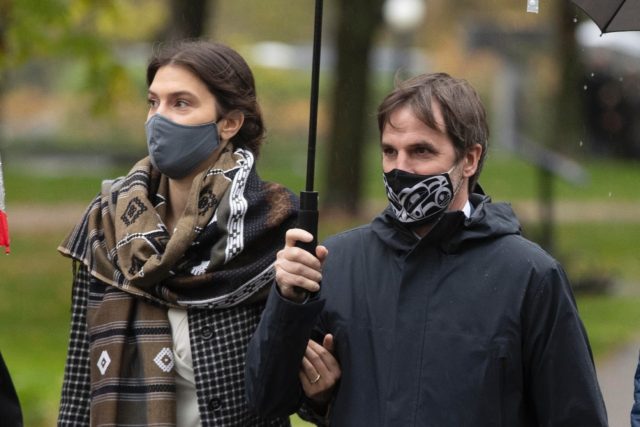Canadian Prime Minister Justin Trudeau on Tuesday named prominent former climate activist Steven Guilbeault as environment minister in a major post-election cabinet shuffle ahead of a key global climate conference.
At a ceremony in Ottawa, Guilbeault was all smiles as he was sworn in alongside 37 other faces, including Anita Anand who was picked to lead a military plagued by sexual misconduct allegations, and Melanie Joly who was appointed foreign minister.
His promotion comes just days before global leaders are set to gather in Glasgow, Scotland for the COP26 summit on climate change.
Guilbeault’s activism dates back to his early childhood, according to his government biography, when he climbed a tree behind his home to prevent real estate developers from chopping it down.
Decades later, he scaled Toronto’s CN Tower in a stunt to press for ratification of the Kyoto Protocol, he co-founded one of Canada’s top environmental organizations (Equiterre), and he has worked in senior roles at several other groups including Greenpeace.
“Steven Guilbeault knows the issues, key players and understands the importance of environmental issues,” Greenpeace’s Patrick Bonin told AFP, praising Trudeau’s pick for environment minister.
He said the new minister’s pragmatism and strong knowledge of environmental issues will serve Canada well.
Guilbeault was first elected to parliament in 2019, serving as heritage minister in Trudeau’s second administration.
He replaces Jonathan Wilkinson, who moves to the natural resources portfolio after recently working with his German counterpart on a target for rich countries to contribute $100 billion a year to help poorer ones fight climate change.
At the COP26 meeting that starts on Sunday, Guilbeault — who cycles to work year-round — is expected to tout Canadian measures to dramatically cut CO2 emissions including from its oil sector, which is the fourth-largest in the world.
“Climate change affects us all,” Guilbeault said, outlining “ambitious new commitments” including the phasing out of fossil fuel subsidies by 2023.
Climate change was a top issue during the election, with many Canadians disappointed by rising emissions despite the introduction of a carbon tax set to increase to Can$170 per tonne by 2030.
Women in top posts
Trudeau was returned to power in September at the helm, once again, of a minority government, with party standings in the House of Commons almost exactly the same as prior to the snap election.
It was not the outcome the prime minister had hoped for, as strong support for his Liberals amid their solid pandemic response suddenly dissipated midway through the campaign as voter fatigue set in with his administration after he was first elected in a landslide in 2015.
On Tuesday, Trudeau said his government had been given a mandate to do “big things.”
“I’m really excited about what we’re going to be able to accomplish for Canadians and I know that this team is raring to go,” he told a news conference.
The prime minister listed priorities when parliament returns on November 22, such as accelerating the fight against climate change, further boosting Canada’s Covid vaccination rates — already among the highest in the world — bolstering the economic recovery, and continuing reconciliation with indigenous tribes.
The reshuffled cabinet consists of 38 ministers, with an equal number of women and men.
Several former ministers were dropped, including ex-astronaut Marc Garneau, and others were shuffled to new posts in a bid to breathe new life into the beleaguered Liberal government. Only a handful held onto their old jobs.
Chrystia Freeland, it was previously announced, keeps her dual roles as deputy prime minister and finance minister.
Joly, who was co-chair of the Liberals’ re-election campaign and held minor posts in past Trudeau administrations, becomes Canada’s fifth foreign minister in six years.
Although Trudeau declared “Canada is back” in 2015 — and marked a few early successes, including the airlift of Syrian refugees and the ratification of European, North American and Pacific trade deals — his foreign policy has become arguably timid in a world facing a growing number of crises.
Anand, who’d previously been in charge of the nation’s vaccine procurement, meanwhile, faces a difficult task in changing the culture of the military.
The Canadian Armed Forces, Trudeau recently commented, “still don’t get it” following several allegations of sexual misconduct in the military’s top ranks this year, adding on Tuesday that the situation has reached a “crisis” level.

COMMENTS
Please let us know if you're having issues with commenting.